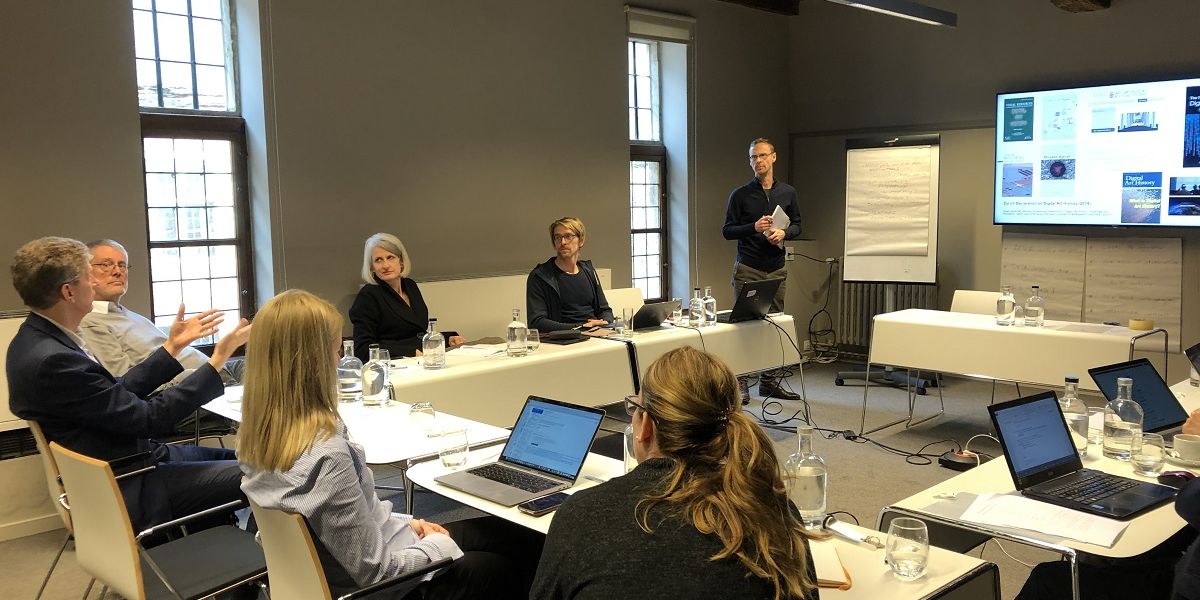Art Markets, Cultural Heritage,the Global & the Digital
Awarded one of the Europeana Research Grants 2019, KU Leuven organised a workshop in Leuven on 11-12 March 2020 and a public event in Brussels on 12 March 2020 in collaboration with Europeana Research.

- Title:
- Photograph from the workshop Art Markets, Cultural Heritage, the Global & the Digital
- Date:
- 12 March 2020
- Institution:
- Europeana Foundation
- Country:
- Netherlands
- Copyright:
- CC BY-SA
About
The workshop was the only event that could take place as an in-person event in the 2019 run of the Research Grants Programme due to the outbreak of the COVID-19 pandemic. The public event planned by KU Leuven at its conclusion was also cancelled for the same reason. You can explore the full programme for these initiatives here.
The workshop brought together experts in art history, digital art history, digital cultural heritage, cultural studies, cultural economics, computer science and finance to address questions including; how can we reconcile and link powerful digital platforms so that art market and cultural heritage researchers can move beyond the case study approach to discover and analyse patterns that help us to understand the worldwide circulation of both European and non-European art throughout the ages? How can we transform new scholarly insights into widely accessible narratives and (virtual) exhibitions targeted at a wider audience?
Read the workshop report, provided by Professor Koenraad Brosens, KU Leuven, and find below a link to the text of the keynote by Professor Hubertus Kohle, Ludwig Maximilian University of Munich, which was part of the programme for the public event.
Art Market Studies in Digital and Global Dimensions: Report from the workshop by Professor Koenraad Brosens, KU Leuven
Recontextualisation and Comparative Views
The availability and accessibility of both big and thick data, coupled with a growing number of empirical studies on Western and non-Western markets for art, should allow art market studies to move:
-
beyond painting;
-
beyond price;
-
beyond Europe and the US;
-
beyond the traditional dichotomy primary versus secondary market;
-
beyond the case study approach;
-
beyond provenance data.
By broadening the scope and recontextualising data, we will be able to compare, correlate and explain the prices of an array of fashion goods in particular places and moments in time, leading to a better understanding of the behavior, development, dynamics, and sizes of art markets on a local, regional and international level.
Data Practices
-
Data (geographically and chronologically diverse) should be discoverable and explorable. The Linked Open Data model is the most effective methodology to achieve these goals. However, seeing the cost and complexities of LOD, individual researchers are encouraged to keep on building relational databases. By using controlled vocabularies and authority lists, these datasets can eventually be shared and linked.
-
Institutions and researchers creating datasets should carefully document and publish their process and workflow, as well as the rationale behind their data modelling, data collecting, data curating, and data publishing strategies. This transparency allows users to open the box and to assess the dimensions and qualities of the data.
-
When researchers distill analyses and arguments from datasets (or simply use data), they should cite the datasets, together with the (online) publications explaining the nature and structure of the datasets.
-
The development of next generation user interfaces should be collaborative undertakings led by computer scientists and developers and including art market researchers and cultural heritage managers. User studies (for example focusing on the effectiveness of tools allowing for probabilistic links and serendipitous discoveries) are needed to develop the next generation of data analysis and data visualisation tools.
Keynote ‘Make the data dance’ by Professor Hubertus Kohle, Ludwig Maximilian University of Munich.
‘For a long time, the political and cultural life of the citizen was characterised more by passivity than by opportunities for participation. People went to the polls every few years, watched political programmes on television, possibly took part in rallies.They attended the performance of a play, looked at pictures in museums or watched the latest James Bond in the cinema. The behavior here was mainly receptive, at best evaluative activities took place inside the subject or could be discussed in the close vicinity of the family, school or workplace. Do not misunderstand me: For all we know, there is no better solution for the practice of democracy, but there might be ways to improve it […].’
